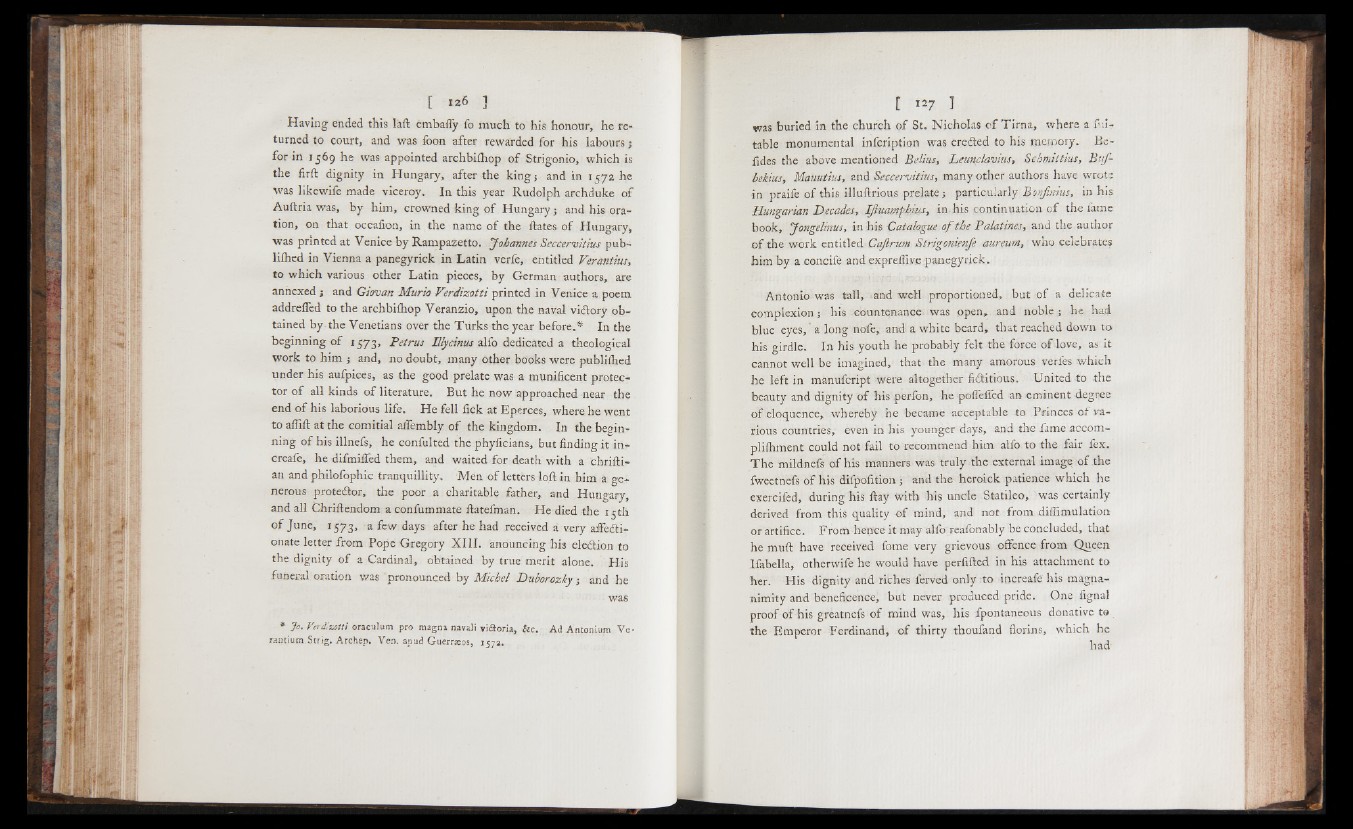
Having ended this laid embaffy fo much to his honour, he returned
to court, and was &on after rewarded for his labours;
for in 1569 he was appointed archbiihop o f Strigonio, which is
the firft dignity in Hungary, after the king; and in 1572 he
was likewife made viceroy. In this year Rudolph archduke o f
Auftria was, by him, crowned king o f Hungary; and his oration,
on that occalion, in the name o f the dates o f Hungary,
was printed at Venice by Rampazetto. Johannes Seccervitius pub-
liihed in Vienna a panegyrick in Latin verfe, entitled Verantius,
to which various other Latin pieces, by German authors, are
annexed ; and Giovan Murio Verdizotti printed in Venice a poem
addreffed to the archbiihop Veranzio, upon the naval victory obtained
by the Venetians over the Turks the year before.* In the
beginning o f 1573, Petrus Illycinus alfo dedicated a theological
work to him ; and, no doubt, many other books were publilhed
under his aufpices, as the good prelate was a munificent protector
o f all kinds o f literature. But he now approached near the
end o f his laborious life. He fell lick at Eperces, where he went
to alfiit at the comitial afiembly o f the kingdom. In the beginning
o f his illnefs, he confulted the phyficians, but finding it in-
creafe, he difmiffed them, and waited for death with a chrifti-
an and philofophic tranquillity. Men of letters loft in him a generous
proteCtor, the poor a charitable father, and Hungary,
and all Chriftendom a confummate ftatefman. He died the 13th
o f June, 1573, a few days after he had received a very affeCti-
onate letter from Pope Gregory XIII. anouncing his election to
the dignity o f a Cardinal, obtained by true merit alone. His
funeral oration was pronounced by Michel Duborozky; and he
was
* Jo. Verdizotti oraculum pro magna navali »¡Soria, tic. Ad Antonium Ve-
rantium Strig. Archep. Ven. apud Guerrxoa, 1572.
was buried in the church o f St. Nicholas o f Tirna, where a fid-
table monumental infcription was ereCted to his memory. Be-
fides the above mentioned Helms, Leunclavius, Sehmittms, Buf-
bekius, Manutius, and Seccervitius, many other authors have wrote
in praife o f this illuftrious prelate; particularly Bonfinius, in his
Hungarian Decades, I/luatnphius, in.his continuation o f the fame
book, Jongelinus, in his Catalogue o f the Palatines, and the author
o f the work entitled Cajlrum Strigonienje aureum, who celebrates
him by aconcife and cxprefllvepanegyrick.
Antonio was tall, and well proportioned, but o f a delicate
complexion; his countenance, was open, and noble; he had
blue eyes,' a long nofe, and a white beard, that reached down to
his girdle. In his youth he probably felt the force o f love, as it
cannot well be imagined, that the many amorous verfies which
he left in manufcript were altogether fictitious. United -to the
beauty and dignity o f his perfon, he poffeffed an eminent degree
of eloquence, whereby be became acceptable to Princes of various
countries, even in his younger days, and the fame accom-
pliihment could not fail to recommend him alfo to the fair fex.
The mildnefs o f his manners was truly the external image o f the
fweetnefs of his difpofition ; and the heroick patience which he
exercifed, during his ftay with his unde Statileo, was certainly
derived from this quality o f mind, and not from diflimulation
or artifice. From hence it ui'ay alfo reafonably be concluded, that
he muft have received fome very grievous offence from Queen
Ifabella, otherwife he would have perfifted in his attachment to
her. His dignity and riches ferved only to increafe his magnanimity
and beneficence, but never produced pride. One fignal
proof of his greatnefs o f mind was, his fpontaneous donative to
the Emperor Ferdinand, o f thirty thoufand florins, which he
had